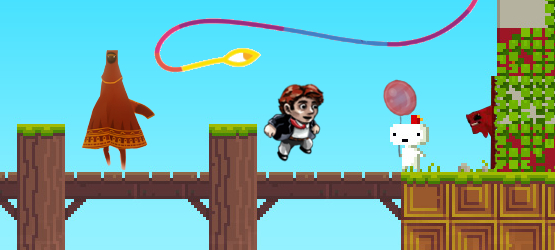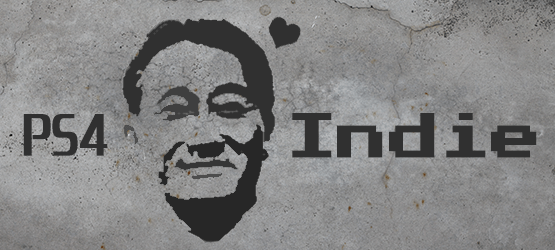A lot has been said about the fact that the PS4 will allow developers to self publish, while the Xbox One won’t, but what does that really mean? To find out how it impacts indies, platform holders and gamers, Daily Reaction’s Seb and Dan talk to some PS4 devs and discuss the topic in their 207th edition.
Seb: Allowing self publishing is huge for the industry, and for PlayStation. Basically, what it means is that small, independent studios don’t have to give 30%+ of their profits to a publisher (often along with the rights to the game/IP and creative freedoms) simply to get on the platform.
Indie developers can make a game, and then they can release the game. It’s that simple. These are digital titles, there’s no need to print off discs and ship them around the world, they simply have to upload them to Sony’s/Microsoft’s servers and hope for the best. But Microsoft demands that devs shack up with a publisher, or sign up with Microsoft as the publisher (which a lot of developers have now said is a terrible idea). Publishers also only have a limited number of ‘slots’ on Xbox to release games, for some reason, so they often don’t want to publish a digital title, unless they are really taking a huge cut.
Add that to the fact that patching a game on XBL costs tens of thousands of dollars, but is free on PSN, and it’s clear why indie developers are flocking to PlayStation. Ask an indie dev what they think about Sony and their face will positively light up, before they start gushing about how awesome Adam Boyes is.
Self publishing is big news for people who actually care about the industry, and about developers. Philippe Morin, the Co-Founder/President of Red Barrels Games and the Game Designer of the upcoming PS4 horror game Outlast, told us:
Oh man it’s awesome, we may never go back. We worked with big studios for 14-15 years and for us it was just time to move on. The problem is that we like making games, but when you become a senior, they make you spend more time in meetings talking about the game. We don’t want to talk about it, we want to make it.
Games that could not be made before are now viable, and award winning PC titles can now come to a console (and they don’t have to put up with the struggles of Steam Greenlight). That means a vast library of titles – many of which are amazing (while others are terrible) – available on PS4 at a low cost, or even free with PS+. That’s an incredible incentive to go online, and a massive feather in Sony’s cap.
Yes, let’s be honest, as great as Octodad is, it’ll never compete in sales with Halo, but that’s not the point. Not only have there been some huge breakout successes, a huge quantity of reasonably selling games adds up, and potential purchasers will be attracted by the greater number of available titles.
Perhaps most importantly for sales to the mainstream audience is simply the good press. While Sony will constantly benefit from tons of publicity over genre breaking games, like Journey, that newspapers feel more comfortable covering than [Insert Shooter], but a Google News search of Xbox One will bring up stories of indie developers bashing the platform (and indie devs are often very outspoken), with Jonathan Blow, Phil Fish, Brian Provinciano and many more openly stating their contempt for Xbox One and Microsoft.
Mainstream readers might not fully understand what is being said (as they sadly don’t read DR), but they will take away one important point – “Less games”. And that’s not a good message to be spread about a platform.
Self publishing is good for developers, it’s good for Sony and it’s good for gamers. The only group that won’t like this are publishers, with their vice like grip on consoles being loosened at last.

Dan: Yeah, the biggest issue with major publishers is their need to only push products that appeal to the general public, instead of producing titles that make the most of what they are. Titles like Call of Duty have become the primary example of how majorly successful franchises become constrained by their own success, and cannot venture too far off the beaten path for fear of losing the audience they currently have. Independent titles are able to venture off freely to explore the depths of approaching game development as an art-form.
Journey was designed without any significant form of communication, short of a beep, during a time when social aspects and mass communication were being thrown into every game. It was a risk that I don’t believe any major publisher of an AAA title would have taken, and that is the magic of the independent scene.
The same can be said for Jonathan Blow’s Braid, whose story was dark and thought provoking, something that turned the concept of simple game narrative on its head, and that was originally on the Xbox. Now, the tide seems to be changing away from Microsoft’s platform, as they appear to have forgotten that they are no longer the only viable choice for developers back in the day. As stated in a GI article by Team Meat’s Edmund McMillen – “Xbox was the only console you could make money off of realistically. It was the only console platform.”
Now that Sony has opened the door for indie developers to self publish, they have moved that whole market to their platform, basically edging Microsoft out. And that means countless incredible gaming experiences are set to come.
Having a small development team that lacks needless boardroom pressures allows creative design to flourish, and means that devs are not bogged down by a team of executives thinking they are gaming’s Michael Bay. Countless times we have seen a narrative being drowned out by shock-and-awe, and any major title that tries to bring more to the table really has to struggle to do that while keeping generically safe. Remember Me and Spec Ops: The Line are a few that come to mind – titles that tried to be more than a blockbuster, but lost most of their heart somewhere in the design process.
Indies don’t suffer this problem, which is why Digital Extremes’ Studio General Manager Sheldon Carter, developers of Warframe, told us:
When you get to have full creative control and you get to do exactly what you want to do, and the only people you are responsible to are the players of your game, that’s the ideal way to develop. I mean, sometime you have publishing relationships and those can be great, or they can be not so great. This would take that totally out of the equation, and the only thing we care about is making a great game that we like and our players like.
As you can see, Sony’s decision to allow self publishing might actually be the biggest driving point to keep developers working directly on the PS4. The ability to control your own IP, as well as keep the rights to it is a major accomplishment that usually only large developers are able to achieve on consoles. Now almost anyone can, and that means that PlayStation fans are almost guaranteed to see some of the most interesting titles this generation.
For Dan’s full Outlast and Warframe interviews, be sure to stick to PSLS. But first, let us know whether you love the indie scene in the comments below, email DailyReaction@PlayStationLifeStyle.net for news on PSLS Publishing House’s Daily Reaction book and follow Seb and Dan on Twitter to lose your self.








